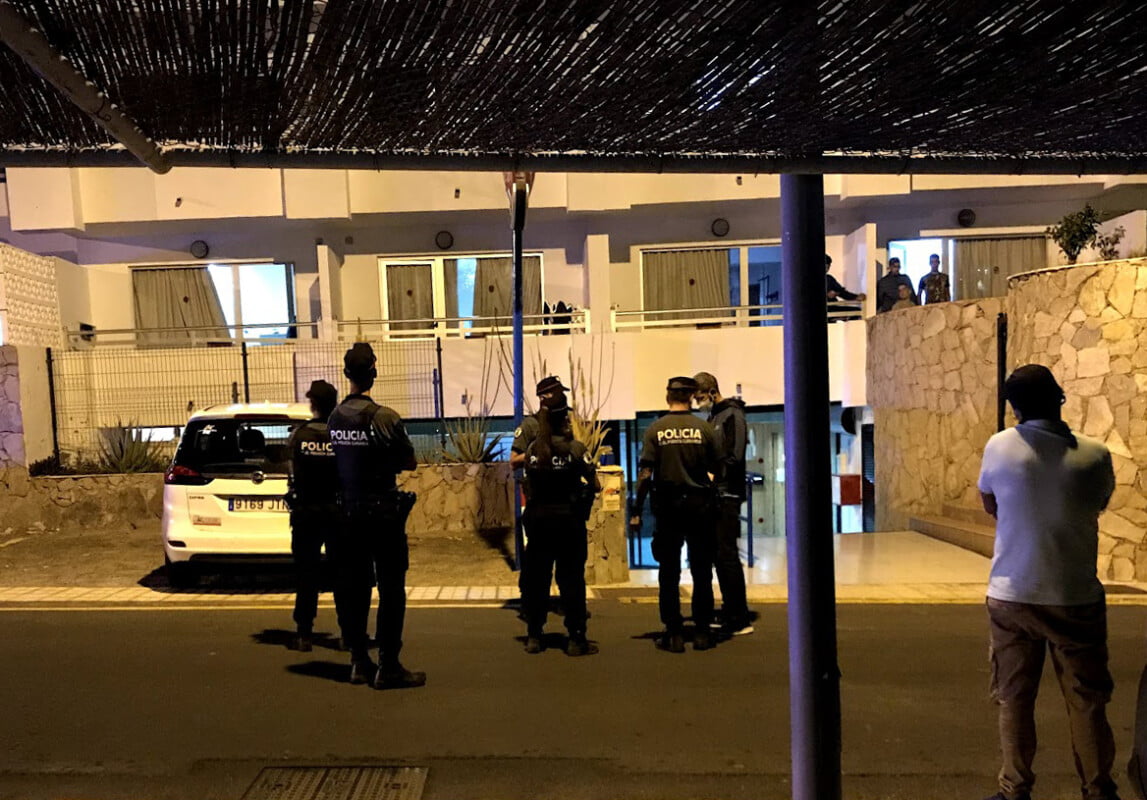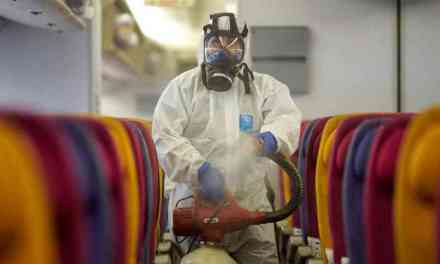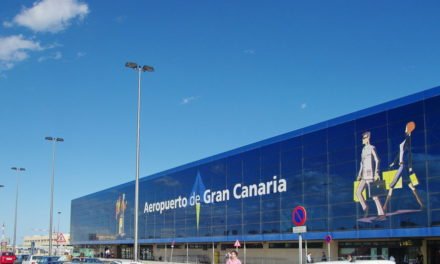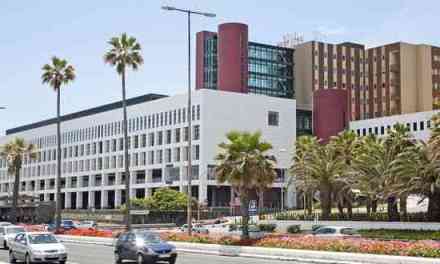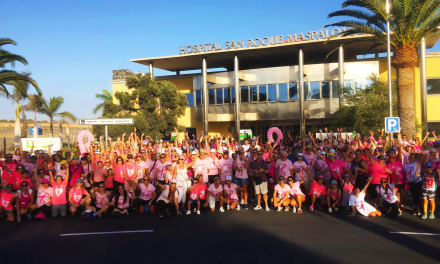Another normal day in Puerto Rico de Gran Canaria, but disturbances, on one street at least, have become more frequent in recent times. Some will claim there are “daily riots”, this is inaccurate. There are incidents, however. Mostly noise related, occasionally more serious. And although almost every problem is pretty well contained within the one building involved, local residents are losing sleep. Some feel threatened when leaving their homes, for fear of the strangers across the road.
Never before have these neighbours had to deal with so many repeated police deployments, sent to calm altercations between raucous young teens, but then there are not really many teens who live in Puerto Rico, the resident population are usually more advanced in years. And then there is the noise, more than there ever used to be, easily heard through paper-thin walls, and open windows, of the tiny studio apartments, originally only meant as temporary accommodation, designed for a week or two in the sun, but now transformed into tiny dream homes, of 20 or 30 square meters, from which a sunset glass of wine on the balcony has ceased to have the same appeal it once did.
– Edward Timon .:.
 On Tuesday night up to nine police vehicles, including Policia Local and Guardia Civil, responded to a loud series of noisy altercations in the 3-star Puerto Bello Apartments, where unaccompanied Maghrebi Migrant Minors have been accommodated for the last six or seven months.
On Tuesday night up to nine police vehicles, including Policia Local and Guardia Civil, responded to a loud series of noisy altercations in the 3-star Puerto Bello Apartments, where unaccompanied Maghrebi Migrant Minors have been accommodated for the last six or seven months.
Local residents gathered on the street to watch as police entered the building to investigate the cause of the disturbance, after youths were reported throwing objects, plastic bottles and rubbish from the balconies of their rooms.
As is often the case with situations like this, there is unlikely to be an official explanation of what happened, as this is an ad hoc “reception centre” for under eighteen year olds, where it is generally accepted that some accommodated there my have issues with authority.
Locals at the scene talk of some sort of loud event, disturbing enough to bring neighbours out in to the street, and for some to take photographs and video of the police arriving and standing outside. The disturbance itself lasted about 10 minutes, and at least 20 agents from the two separate police forces attended, perhaps a sign of the amount of calls they received, though the event appears to have been quickly controlled, their investigation continued quietly for an hour or more, watched by the weary neighbours of Tasartico road.
You can read more about the response to this incident over at El Sur Digital our local Spanish Language Partners on the south of Gran Canaria
Community is very important in a place like Gran Canaria, particularly for foreigners who choose to live here. Failing to understand how the local systems work, or who has responsibility for different areas, or indeed just not wanting to join in with the local politics of the various neighbourhoods, towns and municipalities, means many become disconnected from the practical day to day realities of island life, as well as administrative life in Spain. Often lacking accurate information leaves some foreign residents open to constant rumours and misrepresentations of what is actually happening around them, and why. Nonetheless, people manage to muddle on through, without much concern, until, that is, they are faced with an unavoidable, or unprecedented, large scale situation, for which there can be no easy answers. Without a “usual” communication channel to the authorities, they naturally feel isolated and forgotten, particularly if they don’t understand any Spanish.
 For many weeks, and months, there has been worry, concern and repeated outrage expressed by a small group of residents in the, currently empty, tourist resort town of Puerto Rico de Gran Canaria. Their complaints are centred not so much around the “sudden” surge in African migrant arrivals to the island over the last year, as they are, primarily, against the Spanish Central Government, and Canarian Government’s, failure to properly prepare or respond. Many express themselves as being at their “wits end”, and, sometimes in hateful terms, describe scenes of mayhem “destroying” their lives. As evidence they will offer an occasional image of rubbish on their streets, which used to always remain clean; if a police car, or more than one, shows up, then it is immediately videoed and posted to social media, there have been at least three or four instances of windscreens broken, always photographed, and they talk of continual loud noises at night disturbing their sleep and leading them to feel “besieged” while having to observe curfew, though others are seen breaking the rules on movement at night.
For many weeks, and months, there has been worry, concern and repeated outrage expressed by a small group of residents in the, currently empty, tourist resort town of Puerto Rico de Gran Canaria. Their complaints are centred not so much around the “sudden” surge in African migrant arrivals to the island over the last year, as they are, primarily, against the Spanish Central Government, and Canarian Government’s, failure to properly prepare or respond. Many express themselves as being at their “wits end”, and, sometimes in hateful terms, describe scenes of mayhem “destroying” their lives. As evidence they will offer an occasional image of rubbish on their streets, which used to always remain clean; if a police car, or more than one, shows up, then it is immediately videoed and posted to social media, there have been at least three or four instances of windscreens broken, always photographed, and they talk of continual loud noises at night disturbing their sleep and leading them to feel “besieged” while having to observe curfew, though others are seen breaking the rules on movement at night.
Some say that their world has been shattered. Residents of this particular street, Calle Tasartico, say they have had to unfairly bear the brunt of hastily made decisions, wholly inadequate and rushed remedies, to problems far outside of their own scope of experience, while they try, despite the global pandemic, and the total disappearance of tourism, to continue their lives as they were before.
These residents are used more to living along tranquil, palm lined terraced avenues, nestled onto the quiet hillsides of this sunny little town, built for tourists, which overlook Spain’s very first artificial beach. They see no reason why the outside world should be permitted to change any of that, pandemic or not, migration crisis or not. They feel that they are entitled to be shielded from having to deal with any of these difficult situations, and that they are in fact the primary victims of ill-thought through policies, the faceless politicians who’ve failed them and an apparent lack of interest in their complaints to the authorities. They don’t want any of this, anywhere near them; and who would?
Their angers and frustrations have attracted vocal support, mainly through social media, from various quarters, the largest proportion of which comes from people who do not actually live on the island, but who may visit once or twice a year, and who have little interest in understanding any of the reasons behind the situations that have unfolded. And why should they? For them, this is the place where magical holidays happen, where they come to get away from worldly problems, and expensive beer. And if the tourists can’t make use of the place, during a global health emergency, then it should be left unused.
Saving tourism in Little Britain
Many, along with their supporters, are entrenched in a them-and-us mentality that weaves between various conspiracy theories of why migrants are “really here”, or “still here” and, who is “really” behind it all. Some appear to have switched from decrying Covid-19 restrictions, which stop them getting on a plane, even denying the need for restrictions at all, though most tend to denounce the apparently lackadaisical government handling of both the pandemic, as well as their disgust for the migration response policies invading their world view. More than anything, they share an all inclusive longing to be able to return to the mass tourism, cheap flights and sunny beach holidays that have made this town a favourite among British immigrants and holidaymakers alike.
Regardless of all other considerations, their stated mission is to “Save tourism” and their participation in this fight is visceral. They have attracted as much support as they can, making sweeping declarations, to try to bring attention to their pain, with a few thousand facebook fans and a few hundred Change.org signatures. This has become their cause. And their route to “victory” features the imminent removal of the much vilified youths, that they are forced to suffer in their neighbourhood, while tourists still cannot visit.
Lots of other nationalities enjoy this town too. Nearby Arguineguín is nicknamed Little Norway, for the nordic “snow-birds” who often stay between 3 and 6 months at a time during the winter, and indeed Playa de Mogán, further down the coast, became known as Little Venice, not so much for the increase in Italian immigrants to the island, in recent years, as for its (actually very small number of) waterways and harbour views. More than a few islanders, here, know Puerto Rico de Gran Canaria as our very own Little Britain, with no more than a hint of irony. For many of these foreign residents, it is a paradise over which a dark cloud has arrived and simply refuses to move on.
Nearly eight months is too long
 Now that the vast majority of migrant arrivals, temporarily accommodated in the town over recent months, have been transferred, elsewhere, the main focus of anger centres on an ageing 3-star apartment hotel, where more than 100 migrant minors continue to be kept under the supervision of an NGO, Siglo XXI, who are specialised in working with socially deprived youths. In particular they work with youth offenders, providing “training and social reeducation for those admitted to internment of any kind by judicial measures” as well as attempting to bring about “social integration of minors dependent on public institutions in reception or protection regimes.” We can be sure, however, that they have never been caught in any situation quite like the ones they are having to deal with right now. Hostile neighbours, large numbers of frustrated youths in administrative limbo, with no clear alternatives available and focused on trying to help the youngsters as best as they can, but without the resources necessary to do so.
Now that the vast majority of migrant arrivals, temporarily accommodated in the town over recent months, have been transferred, elsewhere, the main focus of anger centres on an ageing 3-star apartment hotel, where more than 100 migrant minors continue to be kept under the supervision of an NGO, Siglo XXI, who are specialised in working with socially deprived youths. In particular they work with youth offenders, providing “training and social reeducation for those admitted to internment of any kind by judicial measures” as well as attempting to bring about “social integration of minors dependent on public institutions in reception or protection regimes.” We can be sure, however, that they have never been caught in any situation quite like the ones they are having to deal with right now. Hostile neighbours, large numbers of frustrated youths in administrative limbo, with no clear alternatives available and focused on trying to help the youngsters as best as they can, but without the resources necessary to do so.
This foundation is just one of several organisations tasked with trying to take care of large numbers of recently arrived unaccompanied minors, almost all teenage males, that remain the responsibility of The Canary Islands Regional Government. Due to the numbers having to be looked after and accommodated, increasing more than 5 fold in just a few months last year, hurriedly organised solutions were found in the use of empty hotels on south of the island. Though almost all of the adult migrants have been moved on, unfortunately there has been little by way of appropriate alternatives for the youths and so, since at least November last year, this organisation has had to deal with large groups of young teenage men, practically deprived of their freedom, and accommodated on a de facto residential street of tiny tourist apartments, purchased by or rented to longterm, mostly foreign, residents, despite still being very much classified and viewed as tourist accommodation by the local town hall and other administrations. Nobody expected this quick fix to have to last so long, and frustrations are continuing to build.
In fairness local residents say that for the first two or three months they hardly heard a peep out of the youths, however towards the end of January something changed which led to increases in noise and at least two rowdy altercations, which led to the subsequent arrest of four teenagers, one of whom turned out to be an adult male falsely claiming to be a child. He was removed, along with the other troublemakers, having led a noisy little rampage on February 8, which resulted in a microwave being thrown through a window, and police in riot gear going in to take control. There are suspicions from some local observers that this same individual may have been involved in another altercation with police just two weeks earlier at a different complex for minors, and was possibly moved to the Puerto Bello apartments, where he caused more trouble, which then took root. But we are unlikely to ever really know the truths of this story. What is clear is that tensions continue to rise, and local residents are trying to draw attention to what many of them see as an “invasion”, and that has a serious adverse effect on how we are perceived by would-be tourists, and how we perceive ourselves. If we want to recover tourism, we need to stop looking like we are incompetent when it comes to reception and hospitality.
We must not let the indignation, no matter how well placed, nor perception of this being some kind of war zone, perpetuate. It is nothing even close to being a war zone, it is a quiet little street, in a still quiet little holiday resort, which has been forced to confront one of the more serious side effects of a migration crisis for which few had been adequately prepared. Compassion for how we as a society treat children, on their own, has turned into anger and distrust, without dialogue between the local community and the institutions struggling to ensure the care of vulnerable teenagers. There have been outbursts and recriminations. All in all there is a desolate feeling of helplessness.
What we do know is this:
As a temporary fix to an unprecedented emergency situation, accommodating these youths in hotels was effective and very likely the right thing to do at the time. Nearly eight months later, however, an alternative must be now found, and very soon indeed. The perfectly predictable frustrations expressed by local residents, and of course felt by the youths themselves, can no longer just be explained away through urgent necessity. It is deplorable and unfair that the Regional Government appears to have been left utterly isolated by the Spanish State, in the care of these children. The NGO’s involved are under immense pressure from all sides, but for now, it is the Regional Ministry for Social Rights, headed up by Noemí Santana, that must take full responsibility for finding the alternatives needed. These youths must be found a home, or homes, not continue to be kept cooped up in a run down hotel with no clear view of their potential futures.
The Puerto Bello apartments are simply not up to the job. They have served their purpose, when the need was greatest, and it is now time to put an end to all procrastination. Whether the government finds a large country house, or a farm, or one of the many other large empty institutional buildings that may serve as a longer term solution, whether it be an empty school, or an old hospital, whatever the solution is to be, it needs to be found without further delay. The risks to everyone involved are far too great. If this is a matter of money, we must find the money; if it is a matter of security, we must resolve those issues; if it is space we need, then it is space we must find or build; but we cannot let this rot continue further.
Let’s get back to building our communities, instead of allowing them to be so easily divided. Gran Canaria must return to hospitality thinking as soon as possible, and provide adequate provision to ensure these young men are not being unfairly criminalised before they’ve even had a chance to make a life for themselves.
Call it what you like. Call it nimbyism, call it a lack of compassion, call it legitimate concerns for the future of a quiet little street on a hill, whatever needs to happen, this is a holiday resort preparing to return to work, after more than a year of uncertainty and struggle, and no longer can be seen simply as an unused resource temporarily out of operation.
Those teenagers definitely don’t want to be there, and like all teenagers they will acutely feel any hostility towards them and amplify it. This is why a more suitable solution must now be found, this current situation is just not healthy. The residents of Calle Tasartico want their street back to how things were before, quiet, untroubled and without the problems of the outside world visiting their doorsteps or interfering with their little piece of paradise.

